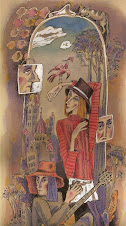How Creativity Keeps Us Ageless
Four tips to unleash your creative energies and counter the effects of aging in the process.
BY: Stephen Ruppenthal
Have you ever thought that giving yourself the time to do that sketch or write that short story might help you stay younger? Studies have shown there is indeed a vital relationship between creative expression and healthy aging. When we draw and paint, we delve deep into the springs of vitality, increasing our sense of self-worth, determination, and achievement. But the University of Kentucky’s Prof. David Snowdon, who tracked the health of 678 Catholic nuns over 70 in his important Alzheimer’s study, showed us much more: he was once given a ceramic sculpture by one of the nuns, Sister Esther Boor, who had taken up ceramics at age 97. When asked by Snowdon to join his project, Sister Esther had originally told him, “I’m too busy with my art to take part in a study of old people." She was not aware of growing older, and she passed away at 107.
All of us know that, when deep in the process creating a short story, a painting, a new business, or an invention, time seems to stand still. Creating something totally new freshens our whole system and frees us from limitations that otherwise can hold us down and drain us of life. Here are four ways you can counter the effects of aging by unleashing your creative energies, testing your own powers of making new things, and breaking through to new solutions:
1. Just start, don’t think. If you feel too emotionally drained or just plain blocked, get a pad of paper and pour out all the nagging resentments, fears, and worries that block you from starting an important project. Acknowledging feelings can enable us to move past them and really get started. This, of course, also means dedicating ample time and space for the creative work. A friend of mine had trouble realizing his gifts until he freed enough time to tinker in his garage. Now he exhibits dozens of motor scooters, cars, and even a bread truck, all artistically converted to brightly painted electric-powered vehicles. I ask him how old he is and he says it’s tough to keep track.
2. Try making your own environment a work of art. And while you’re at it, have some fun! We all start with a blank slate in our living space. Whether you reorganize your office, redecorate your home, enrich your relationships, or beautify your yard, let these efforts mirror the best and most beautiful in you. My wife and I purchased five very barren acres some years back and have since spent every spare minute we have planting flowering herbs, luscious berries, stately fruit trees, and hardy landscaping bushes. In comparatively little time, the parched landscape has given way to lush green views in all directions. And inside, a neglected, ramshackle farmhouse now boasts rich French country colors on all its walls. Don’t be afraid to test your creativity in playful ways, even if you muff it and have to start over. The playful energy all of us have not far beneath the surface helps us feel young and free, regardless of our body’s age.
3. Follow your highest hopes and dreams. Strangely enough, researchers who investigate longevity are finding old age can be a peak period for more, not less, creativity. "We always think of winding down in old age," says Judith Salerno, Britain’s deputy director for the National Institute on Aging. "We need to begin thinking about late life as an opportunity for people to explore." So in the years that used to be considered old age and dotage, now we see experience as an incalculably rich resource. Don’t settle for a shut-down life where the resources of youth are just vain memories; tap your rich experience, whether through art, invention, social service, or transformation of the environment. A higher number of age will only mean you can realize your highest potential and develop talents you never knew you possessed.
4. Dedicate time each day to creative projects, and have faith in yourself. Whether your gift is to be a writer, painter, actor, or a healer of personal relationships, you need to devote time to it every day. “But I can’t do it,” people say, “it’s too big!” So just try breaking your larger projects into smaller, more manageable pieces. As St. Francis says, “Small beginnings, greater ends.” Don’t try to write the whole novel or you will clam up and get scared. Maybe today you will just write one paragraph or carve one lock of hair onto your sculpture, but that will unlock your greater resources. Over time, something will just lift you up. A power coming from deep within you will fill in the blanks, making the universe—and yourself—richer, more beautiful, and full of the wealth of creative life that has no age.
Reprinted from DirectAwakenings with permission.
Dr. Stephen Ruppenthal is the author of 'The Path of Direct Awakening: Passages for Meditation' and 'Keats and Zen', among other books. He is an international workshop leader in passage meditation and specializes in end-of-life spiritual care.
I Left MAGA Host SPEECHLESS on CNN
2 weeks ago










No comments:
Post a Comment